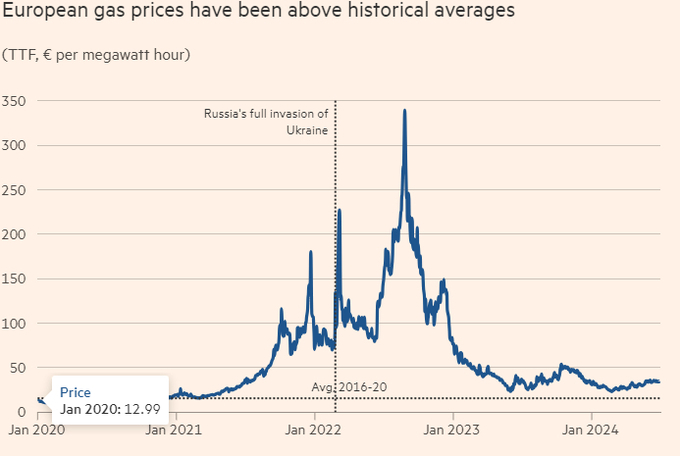May 22, 2025 | 10:12 GMT +7
May 22, 2025 | 10:12 GMT +7
Hotline: 0913.378.918
May 22, 2025 | 10:12 GMT +7
Hotline: 0913.378.918

A flood of cheap Russian fertiliser risks driving European producers out of business or out of the continent, posing a risk to long-term food security, the crop nutrient industry has warned.
The flow of Russian natural gas into the EU slowed significantly after the country’s full-scale invasion of Ukraine, and European countries have shifted to other sources of supply. But Russia has continued to use its gas to produce, and export to Europe, cheap nitrogen-based fertiliser.
For some types of fertiliser, such as urea, imports have even increased since Moscow’s invasion of Ukraine in 2022. The cheap fertiliser has helped European farmers, but the region’s own fertiliser producers have been struggling to compete.
“We are right now being flooded by fertilisers from Russia, which are significantly cheaper than our fertilisers, for the simple reason that they pay peanuts for natural gas in comparison to us European producers,” said Petr Cingr, chief executive of SKW Stickstoffwerke Piesteritz, Germany’s largest producer of ammonia.
“If politicians will not act,” he warned, Europe’s production capacity “will disappear”.
Cingr’s comments echo those of Svein Tore Holsether, chief executive of Yara International, one of the world’s largest producers of nitrogen-based mineral fertilisers, who said in April that Europe was “sleepwalking” into dependence on Russian fertiliser.
Western sanctions carve out exemptions for Russian food and fertiliser exports to avoid hampering food security, but Cingr and Holsether argue that Moscow is using this loophole to fund its war chest.
Tim Benton, food security expert at Chatham House, said European producers have long complained about the advantage their Russian counterparts derive from cheaper natural gas. But their arguments have more weight since Russia’s full-scale invasion of Ukraine, he said.
Benton said that as the world grows more “contested and conflicted”, Europe’s focus may need to shift from market efficiency to “the security of our supply”.
This raises the questions: “What is the risk to our food security? And should we therefore pay a risk insurance premium by encouraging local industry to [survive] through periods where they are not globally competitive?”
He added that “it’s not unreasonable to suggest” that UK and European farming could face harm if the continent became reliant on imports from Russia and other “potential enemies”.
A third of EU imports of urea, the cheapest form of nitrogen-based fertiliser, come from Russia, with the amount imported in 2023 close to record levels, Eurostat data shows. Poland’s imports of Russian urea climbed to almost $120mn in 2023, up from just over $84mn in 2021, for example, according to customs data.
“The crisis years are coming for the European fertiliser industry,” said Benjamin Lakatos, CEO of MET Group, a Switzerland-based energy company that in June announced its intention to acquire majority shares in Baltic fertiliser producer Achema.
With 70 to 80 per cent of the running cost of a fertiliser company coming from natural gas, the industry would be affected more quickly than other sectors by rising gas and energy costs, he said.
Other big players are leaving the market. BASF, the world’s largest chemicals group, has shrunk its operations in Europe over the past few years, including its fertiliser business, and instead focused new investments in the US and China, where costs are lower.
“Sooner or later, everybody, most probably including us, will follow,” said Cingr, of SKW. His company is negotiating an option to install an ammonia line in the US, where “we can be supplied by much cheaper natural gas, much cheaper electricity and we can be subsidised via inflation Reduction Act”, he said.
With no production in Europe, the bloc will depend on imports from other, mainly non-democratic countries, such as Russia and its ally Belarus, said Cingr. With such leverage over European food production, “nobody knows what Putin will do,” he said.
Brussels would be unlikely to respond to calls for sanctions on Russian crop nutrients, said Chris Lawson, head of fertilisers at consultancy CRU. “The memory of high fertiliser prices in 2022 and threats to food security still linger large in the memory of policymakers,” he said.
(FT)

(VAN) Attempts to bring down the price of the Japanese staple have had little effect amid a cost-of-living crisis.

(VAN) Fourth most important food crop in peril as Latin America and Caribbean suffer from slow-onset climate disaster.

(VAN) Shifting market dynamics and the noise around new legislation has propelled Trouw Nutrition’s research around early life nutrition in poultry. Today, it continues to be a key area of research.

(VAN) India is concerned about its food security and the livelihoods of its farmers if more US food imports are allowed.

(VAN) FAO's Director-General emphasises the need to work together to transform agrifood systems.

(VAN) Europe is facing its worst outbreak of foot-and-mouth since the start of the century.

(VAN) The central authorities, in early April, released a 10-year plan for rural vitalization.